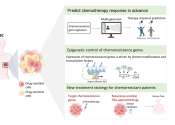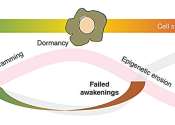In biology, and specifically genetics, epigenetics is the study of heritable changes in gene expression or cellular phenotype caused by mechanisms other than changes in the underlying DNA sequence – hence the name epi- (Greek: επί- over, above, outer) -genetics. Examples of such changes might be DNA methylation or histone deacetylation, both of which serve to suppress gene expression without altering the sequence of the silenced genes. In 2011, it was demonstrated that the methylation of mRNA has a critical role in human energy homeostasis. This opened the field of RNA epigenetics.
These changes may remain through cell divisions for the remainder of the cell's life and may also last for multiple generations. However, there is no change in the underlying DNA sequence of the organism; instead, non-genetic factors cause the organism's genes to behave (or "express themselves") differently.
One example of epigenetic changes in eukaryotic biology is the process of cellular differentiation. During morphogenesis, totipotent stem cells become the various pluripotent cell lines of the embryo which in turn become fully differentiated cells. In other words, a single fertilized egg cell – the zygote – changes into the many cell types including neurons, muscle cells, epithelium, endothelium of blood vessels etc. as it continues to divide. It does so by activating some genes while inhibiting others.









